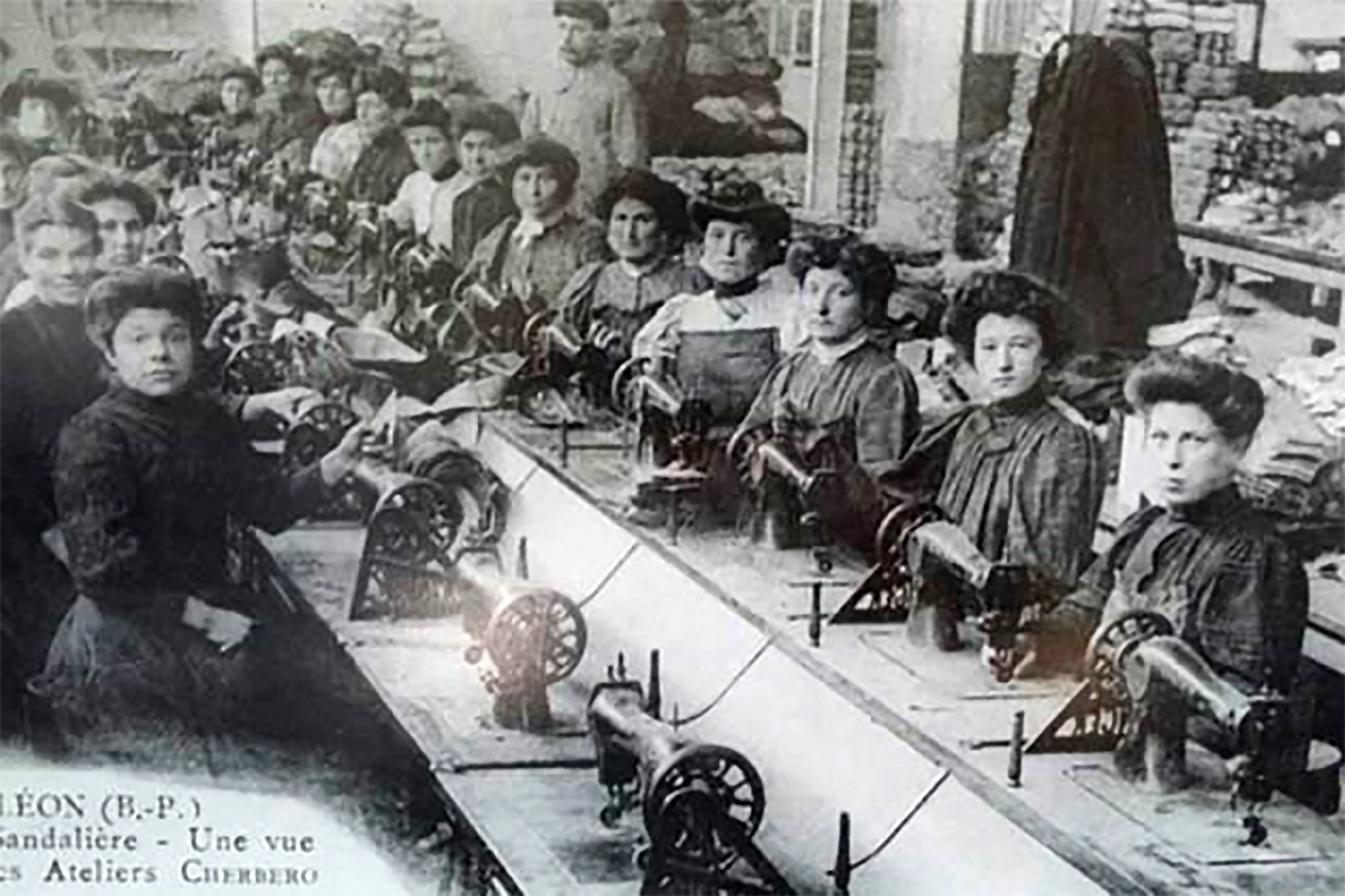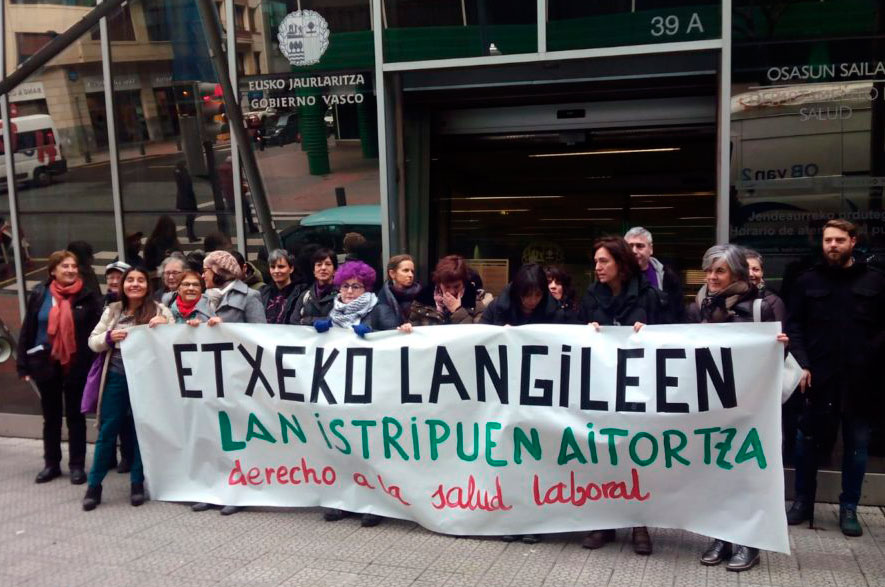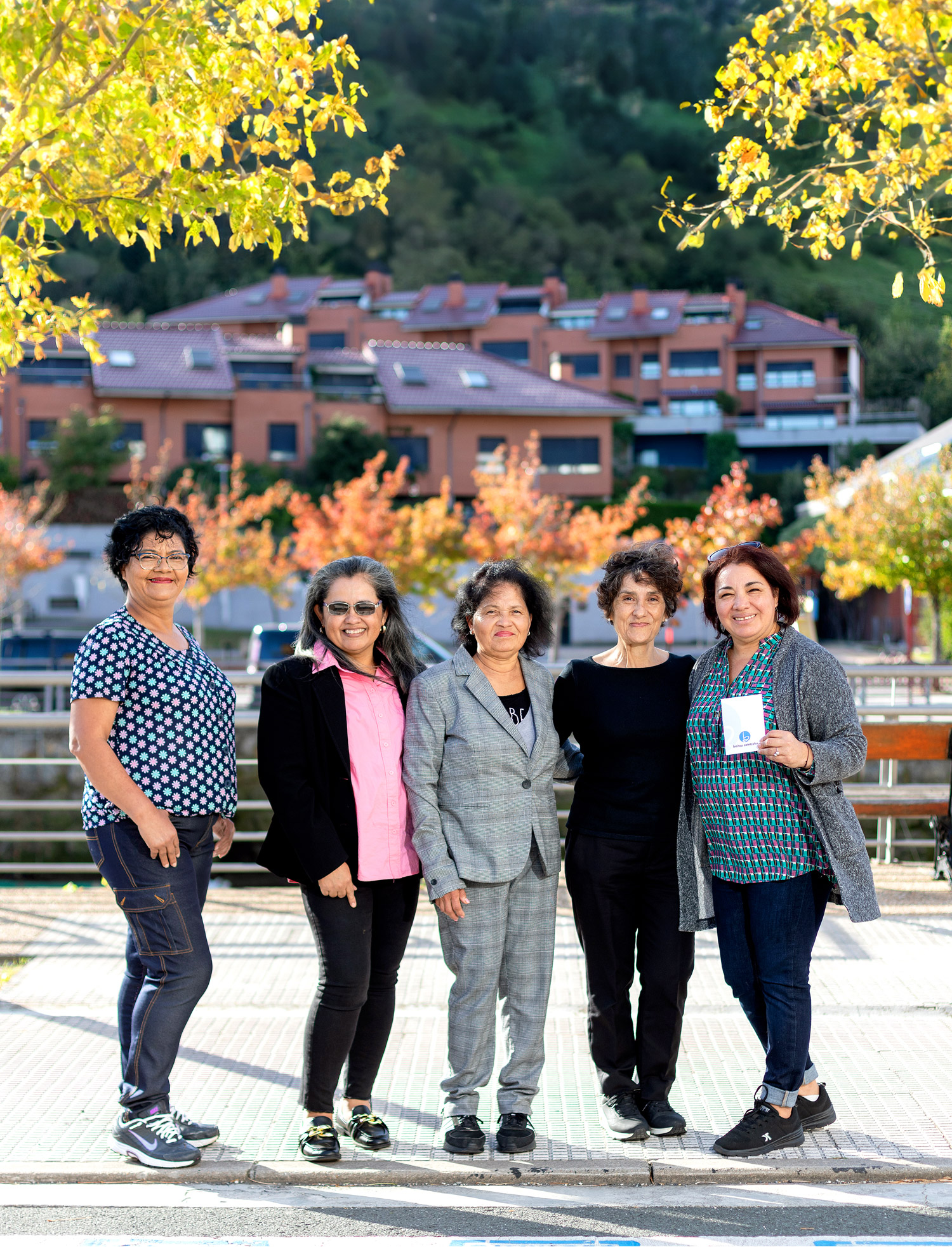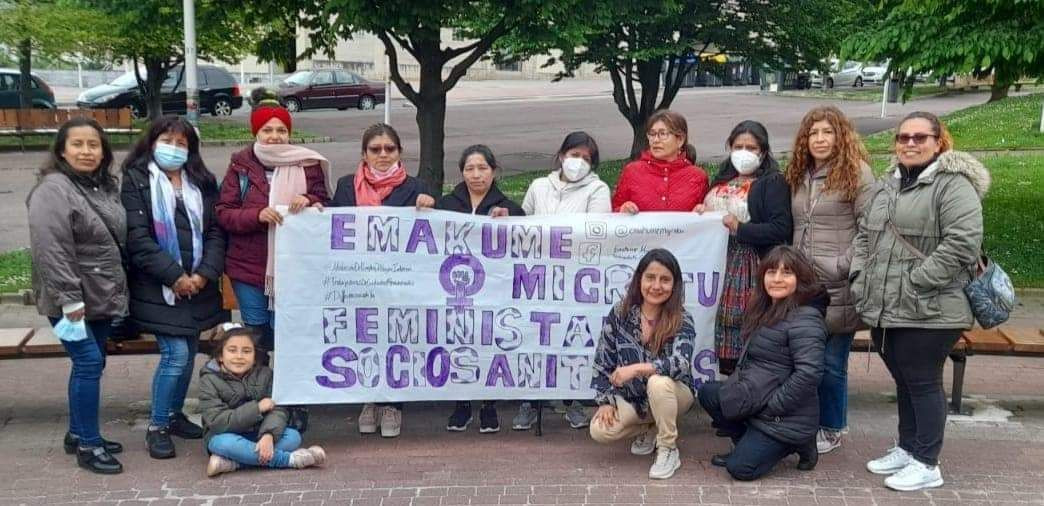"Migrated and racist women are fostering with our bodies a care system that should be public"
- The Association of Feminist-Socio-Sanitary Migrated Women (EMFS) celebrates its first anniversary. It brings together workers who care for dependents at home and, although they have so far moved in the Autonomous Community of the Basque Country, they are eager to broaden the scope of influence as they progress along the way. Objective: to professionalize socio-health care, differentiate it from domestic employment and achieve a collective agreement of its own that guarantees working conditions dignas.Mar Juncay (Loja, Ecuador, 1970) arrived in Euskal Herria 22 years ago and has since been caring for elderly patients with Alzheimer's disease. He is one of the spokesmen for the EMFS association and has in his hands an assessment of these twelve months.
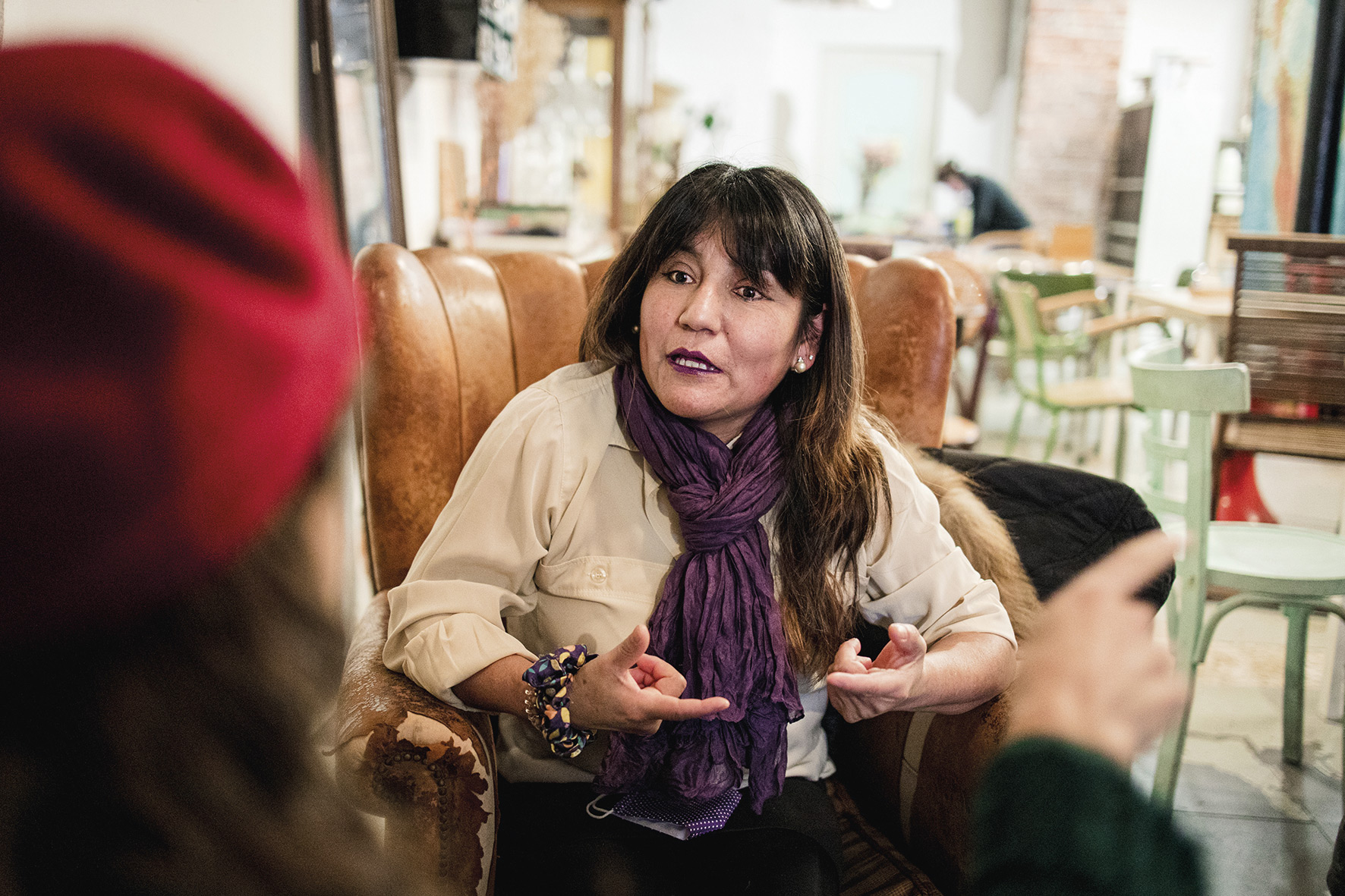
Last year, around this time, a dozen women started penetration work. More than a hundred health workers are now claiming their rights.
To a large extent, COVID-19 is the origin and reactivation of our struggle. The black economy and temporality have kept us isolated, but so far it has been an opportunity to share the concerns we chewed inside, and we will try it!
What has been the incentive?
Probably the lockdown. The Royal Decree-Law of 29 March 2020 included in the list of compulsory activities the care of elderly or minors, as well as the care of people with some degree of disability and/or dependence. However, it is not the activity of those who only perform housekeeping. For the latter, moreover, the Government of Madrid approved an extraordinary subsidy. Incidentally, in the face of the situation of Alarm, the difference that we proposed for a long time was revealed: socio-health care is not the same as household tasks. Its implementation was the first step towards the social, legal and professional recognition of our sector. From that point on, we must ensure that the care of dependent people goes out of the bag of domestic tasks, a self-employment agreement. We are skilled workers, we want them to value us.
But ‘Social-Health’ is the last name of the association. Before you are Feminist Migrated Women.
Unfortunately, we still do not have statistical resources, which also corresponds to public institutions, but from our experience and knowledge we can say that the vast majority of people who attend to dependents in the CAPV are migrated women, and that 100% also have to assume domestic tasks in the same job, either hired or acting irregularly. This allows situations of semi-slavery or full slavery, especially in the case of internal workers. Of course, we consider ourselves feminists, and before the constitution of the EMFS we have worked in different spaces of empowerment; in the World March of Women in the Basque Country, in the Tower of Babel program, in the Political Action Group of Domestic Workers (GAP), of course… and that is why we believe that the feminisms of white women and we do not share the defense of equality.
.jpg)
Why not?
Many of the ups and downs to bring life and care to the city center have become boluses in recent years, especially in the previous two M8. In the banal speeches of some politicians and also among the people on the street. The feminist movement struggles to make visible works that have historically been free of charge to the patriarchal system and which value as such, such as works, works related to reproduction, the home and care. We share this aspiration, but it is not enough. Look, when, in July last year, the deadline for access to the extraordinary allowance for domestic workers was closed, only 52,000 applications were registered in the Spanish State. As I say, unfortunately we lack data, but we know that there are thousands more women working on it. Those who do so without a contract, including the premises, have therefore been left unprotected. But many others who have not applied for the grant are migrant women. The latter are responsible for cleaning, preparing meals, ironing clothes and caring for a dependent person, at the same time and in the same workplace. Even in the strictest confinement, they remained in the homes of the beneficiaries, protecting their lives, building walls. The Internet more than ever. And those who operate without a contract became interns to avoid unauthorized displacement.
During this year, the pandemic has highlighted the multiple weaknesses of our society, our institutions and the system itself. In relation to you or to the extent that it affects you, which would you stand out? We have understood that
people are interdependent and, in this respect, we should rethink the question ‘Who needs who?’. Economic migrants have come here driven by our many shortcomings. But this society also needs a lot. In these months, we're reaching out to a lot of women, and most of us say, "Well, at least I have a job and I win more than in my country." We will have to go a long way beyond fears until we ourselves are worth it. But we are left with the reasons, because migrated and racist women are promoting with our bodies a care system that should be public.
In addition to the public, what should this surveillance system be like?
Comprehensive. On the one hand, it meets all the physical, psychological and emotional needs of the beneficiaries. And that it guarantees the professional training and decent working conditions of the staff who are going to work on it. For a second- or third-degree dependent person to move from bed to chair, for example, it is essential to know the mobilization techniques so as not to harm the bodies of the beneficiary or the caregiver. Similarly, the caregiver who works without defined schedules or breaks will hardly meet the affective needs of the patient, for example, it is impossible! We also lack numbers, because they do not resort to doctors and psychologists... but cases of depression and anxiety are frequent among health care staff. That is why we want to appeal to the families of dependent family members to empathise with us and join in this fight, we will all win! By protecting our rights they will be protecting the rights of their family members. On the contrary, precariousness makes us more vulnerable to all the violence that permeates our bodies, which negatively affects the people we care for.
"White women's feminisms and we don't think equal in the defense of equality"
What are these violence?
For those of us who suffer for being women, migrated and racist. Racism can take many forms: the mistrust of what we are going to steal at home, the rejection of our eating and cooking habits, the paternalists of aliases… And then, many of us, most of us, come from Latin American countries, and the stereotypes that have been built in the West around Latin women, have given way to many excesses. This idea of a passionate woman… Unfortunately, we have heard some testimonies of women who have suffered sexual, verbal or physical violence, which usually comes from a relative of the person they care for. Proposals of a sexual nature, tactful and, in the most serious cases, rape, always threatened with dismissal.

Don't pose all kinds of challenges to you. Where have you started? What's the first thing you've dealt with? We are collecting and
sharing information on the legislation applicable primarily to migration and socio-occupational integration processes, as some are unaware of their fundamental rights. Most are associated with the first ‘house’ from their home country, some are indebted to pay for the airline ticket and start working the day after their arrival, in many cases as employees of the house. Especially in the first few months, isolation is total, the health emergency has increased the digital divide. Others are nurses or physiotherapists, but here they are condemned to that niche of domestic employment. From each of the members that joins us, we are getting to know the different experiences and identifying the main problems or barriers. Some are of a general nature, most say they feel overwhelmed and drowned in institutional efforts for foreigners. And other issues are very specific, but they're constantly recurring.
For example,
placement companies for domestic employment have started to apply for a socio-health training certificate, because families naturally want skilled workers. But the hours of the courses offered today are not compatible with the days of these women. Another widespread case study is that a family pays a woman in an irregular situation to take care of her family member without a contract, even if she has the necessary training to do so. Well, if the social services of the Basque Government recognize this family member the dependency and the corresponding financial assistance, if the family wants to continue with the same woman and this time with a work contract …, it cannot do so until it is proven that the employment of two years or the social consolidation of three years is demonstrated. There are also cases against, that is, those who bring every three years a newly arrived woman to avoid the quote. At the moment, the Spanish Foreign Law is the main accomplice of our precariousness. We ask that, for the sake of the well-being of the people we care for, they review the conditions of regularization of socio-sanitary migrated women and expedite the processes.
And do the laws and decrees regulating dependency sufficiently protect caregivers?
Unfortunately, there are those who also see the possibility of a trap on this occasion. They seek refuge in the Foral Decrees of integration of family caregivers as agents in the system of social services and regulation of their statute. For example, in the case of the Historical Territory of Bizkaia, Decree 192/2018 establishes, among other things, that a family member can be cared for up to the third degree of consanguinity, provided that he is registered in the same domicile of the beneficiary. In many cases, as they appear in official documents, they perceive the benefit, but in reality they do not live with dependents and bring a woman without papers to lower expenses. Now it is also happening with the management of vaccination appointments: first they have mentioned the dependent people and then those who appear as caregivers of them. Therefore, some family members may receive the vaccine and, consequently, the woman who actually lives and cares for the dependent person may be left unprotected. And another aspect to keep in mind is that not all neighborhoods and houses are the same. From the point of view of infrastructure and comfort, it is not the same to care for an elderly person affected by Alzheimer’s in a Neguri chalet as in a closed apartment on the seventh floor of Otxarkoaga. However, human quality has nothing to do with the class, and fraudulent experiences have also occurred within families with more money.
How are they going to go down the road to achieving the goals?
We are going to continue to enter and see the creation of cooperatives as an appropriate interim formula. In 2018, for example, we created SINA in Bilbao. Unlike placement companies, we guarantee fair working conditions. In the employment contracts we specify salaries, working hours, tasks, etc., as well as rest and sleep hours in the case of internal staff. We are qualified to offer comprehensive quality care, we protect each other, and so we also protect the well-being of those we care for.
Amanda Alfaro
Member of EMFS
Jinotega, Nicaragua, 1972

“I am 49 years old, I came when I was 35. There he had a business, a small restaurant, in a big bus station. But they opened a supermarket and I ran out of customers. My children were then 12, 10 and a year old, I was alone, and I saw no sign of a future for them. In Euskal Herria, I spent the first ten years working on ‘7x24’, caring for the people who thought they depended, but actually assuming all the household tasks. And always in-house, in ‘black’ in the early years and on many occasions. At best, with a domestic employment contract.
I mortgaged my house to pay for the trip from Nicaragua to here, and I was still owed by the loan I had asked to open that restaurant. I left the kids with my sister and her husband, and I came with a tourist visa. After a year, I set myself the goal of paying off all the debts, and I dreamed of paying for the studies of the little ones. The travel agency introduced me on a tour that was going through Paris, because it was supposedly safer than stopping in Madrid. I left Nicaragua on 12 November, arrived in San Sebastian on 18 and the following day I started working in Bilbao. My first job I linked it through acquaintances, an old woman with Alzheimer's. I still didn't know this disease, I was scared by the situation, I saw myself very lonely and helpless, and I didn't know if I explained illnesses many of the things that happened in that house, if they were unacceptable or if I lost my head. She needed help to move, she was weak, but very authoritarian: orders at all times, screaming at all times, ugly, which was worthless, not to leave without him, not to talk to anyone… That woman had to prepare meals, give food, wash, arrange clothes, pick up the house, do shopping… everything. At night, I couldn’t rest seriously because she didn’t even sleep… Just two months of anxiety and tachycardia, without force, the woman’s relatives took me to the hospital and told me not to come back. I was paid EUR 1,000.
I found a room in a shared home, lived with three Bolivian girls for a couple of weeks, and with them I got my second job. She was also an elderly woman, but she had her head in her place. She was hugely wealthy, four women we were at her service at home. I was very racist and controlling, but thanks to the complicity of my colleagues, I was able to complete training in socio-health care. He was told that I went out shopping every time I went to school. In that house I did just over three years, including on Saturdays and Sundays, I think it was the only one that lasted so long! Andrea fell ill and took care of him until the end. Finally, the treatment of me was never entirely correct, but he died in my arms, and at that time I learned that our work has a lot of affectivity, that we meet a lot of needs and needs that are not physical. I've seen loneliness not only within myself, but also within those I've cared for.

Although in the last few months I worked with a work contract, when that woman died, I had to start again from scratch, without benefits, without a roof… until I looked for something else. And that's the dynamic of many of us. From one house to another, until the ones we care for go, or until we hold them. That has happened to me twice, that is to say, that I resign. In one case it was because I was hungry. The son of the woman he was caring for lived in the same house and told me that he was fat, that Latinos don't know how to eat. The only thing I understood was making soup, and I was incognito eating in my little room, cookies and cold things bought from my pocket. Again, I left because the son of the man I was caring for wanted to touch his thighs. He insisted for months, to see why he did not allow him to caress and even went so far as to oppose my wishes. On other occasions, unfortunately, I have accepted abuses that I didn't have to remember and watch with my children.
But four years after I arrived in Euskal Herria, just get the residence permit, when I went to Nicaragua to see my children, the world came to me in addition. Yes, I was paying for their studies. If they had to eat, they were dressed well… but they hated me. How many nights I was going to spend awake… waiting for the time to make a voice call… And now I was there, but my children didn’t want to hug me. Later, my eldest daughter explained to me that neighbors insisted that my mother had left; that she was working, but that I came to live life here.
Four years ago I said that it is enough, that my body can withstand only working and living in another's house, at least in exploitative conditions n.He come to lose its soul. Confuse day and night. I've earned money, but I feel I've largely lost my children's trust and love. I swear, I need needs, I will never accept it again. Together with the EMFS, we're adding forces, we want recognition and we're going to work for families who just demand care tasks. A couple of years ago, I was able to bring my eldest daughter. His boyfriend and the child they have together also live with us, and recently also a brother of him. We are trying to recover lost time, because the relationship heals.
Maule, 1892. Eight women from the Salazar Valley headed home from the capital of Zuberoa, but on the way, in Larrain, they were shocked by the snow and all were killed by the cold. Of the eight, seven names have come: Felicia Juanko, Felipce Landa, Dolores Arbe, Justa Larrea,... [+]
International Migrants Day is celebrated on 18 December. Last year, an institutional event was held at the Alhóndiga in Bilbao in cooperation with the social partners and I was invited to participate. There I had an unbeatable opportunity to meet new creators and, above all, to... [+]











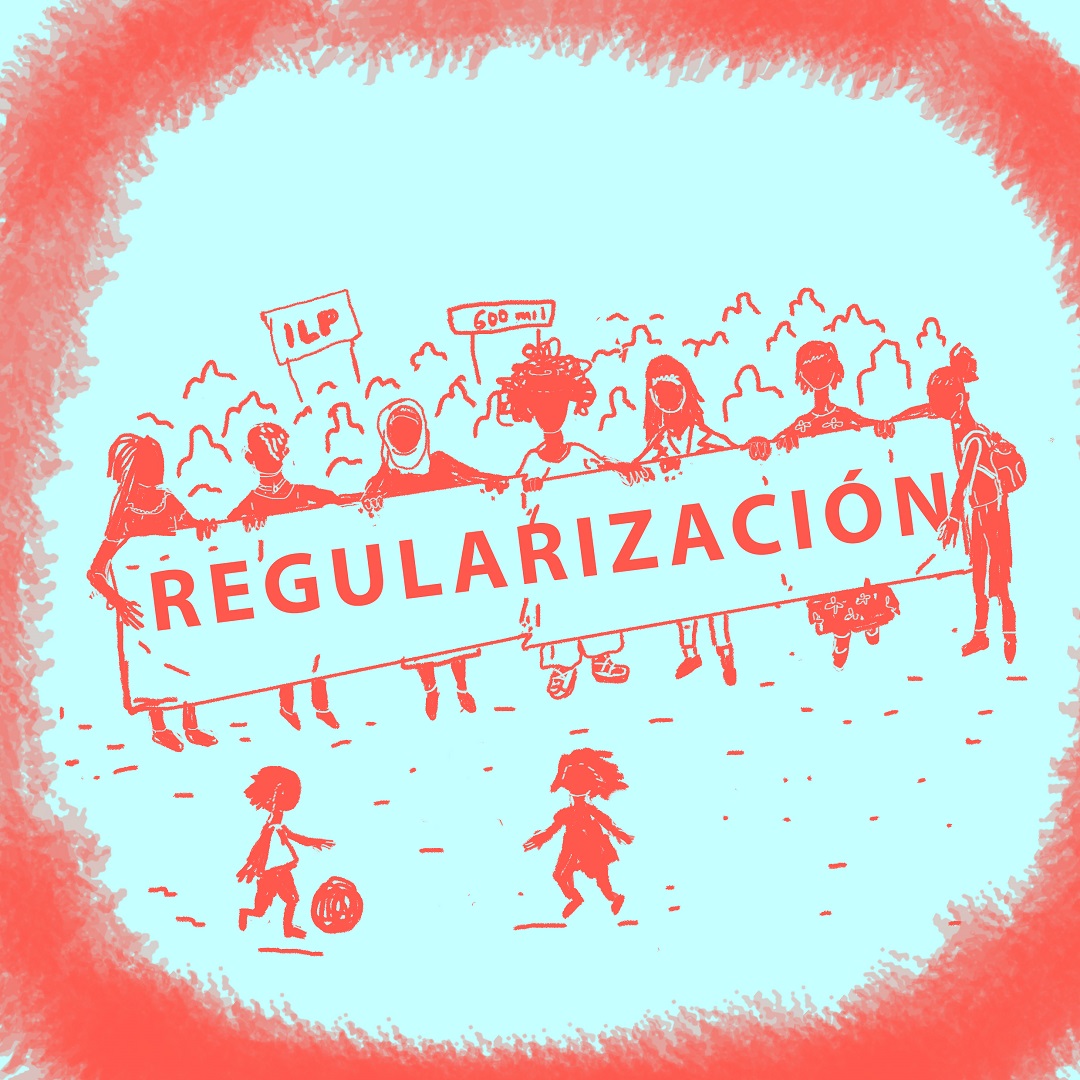
.jpg)
